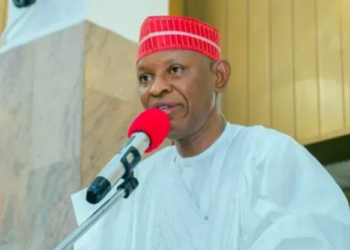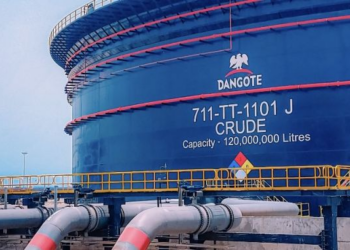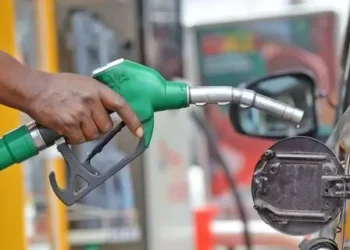Ajuri Ngelale, the Senior Special Assistant to President Bola Ahmed Tinubu on Public Affairs has said that more refineries in Nigeria, will not lead to lower fuel prices. He stated this during a recent interview via TVC News.
According to him, people often say that if the country’s refineries were working, fuel would be cheap for Nigerians at the pump, but nothing could be further from the truth. He said:
- “That is a myth, it does not happen anywhere in the world, even if we had the most refineries producing the most PMS in the world, you would find that the most prolific PMS producers with their refineries do not charge different from the countries without refineries. I am not saying that we should not have refineries, but there are benefits to having working refineries.
- “This is why phase one of our Port Harcourt Refinery is coming on stream in December 2023 and phase two by the end of 2024. Dangote Refinery is already up and is going to start dishing out products very soon.
- “BUA 200,000 bpd Refinery is coming up in Akwa Ibom, we are going to have an excess supply that we can export internationally.
- “The point I am making on this is that the reason why the price at the pump will not go down irrespective of what our refining capacity is as a country is that nobody spends tens of billions of dollars on building a refinery because of charity or corporate social responsibility, they do it to make money.”
Ngelale also argued that no matter the number of oil marketers bringing the product into the country, the price is dependent on the price of crude oil in the international market.
According to him, when crude oil prices are high, fuel pump prices will be high, but when crude oil prices are low, fuel pump prices will be low.
He said the market fundamentals apply to every country, not just Nigeria.
More insights
According to Ngelale, the benefit of having refineries in the country is not that people will have cheap fuel, but that the country will save hundreds of millions of dollars in transportation and logistics costs that are spent on an annual basis.
He explained further that money is being spent to bring refined fuel from an international refinery to Nigeria via shipping.
He also said about $10 billion a year is spent on foreign exchange earnings that are paid out to the refiners and partners to get the product transformed from crude to refined premium motor spirit (PMS).
All these can be saved if the country has functional refineries, but it does not guarantee cheap fuel at the pump.

























Ok begin to name all factor that determines the price and let see if transportation and shipping logistics will not be included.
How can you say that if our refineries are okay pms will not come down,the billions of dollars on refined products and the transportation will reduce it drastically and selling to Nigerians at a reasonable price and exporting will bring profits to Nigerians too,saying all this shows that you and your others don’t mean well for our only Nigerian & the Nigeria people.
Well, he is a media guy and probably does not understand the economics of pricing that much (no disrespect to him intended). He probably does not understand that cost of transporting crude will be reduced (we assume that Nigerian crude will feed these refineries), cost of transporting the finished products will be reduced, labour cost per head will also be lower than say refinery sited in Europe.
This is true but Nigerian refiners should be considerate and give to consumers part of their savings in transportation
whilst true but it will save us billions in FX and improve the value of the naira. Energy import is our largest FX demand and refining locally an help a great deal to curb inflation.
Probably, it will not lower the price but it have multiple effects on growth and development. The only reason for the negative effects of increase in fuel price is because it is a major source of energy for the common people.
Yes, some fx should be saved. But not much though, with much of the other refinery inputs mostly imported, such as machinery, spare parts, chemicals, maintenance, servicing and expatriate costs among others.
This really is like pre-fixing the price of the to be locally produced fuel. The beauty of private initiative is to be very efficient in production, lower the costs of production and sell better quality at cheaper price that competitors.
When a government official speaks on prices, he is placing a cap of their minimum selling prices which defeats competition and is not to the advantage of the public.
These guys think we are illiterates. You are sourcing your crude oil locally and you are refining locally and yet, prices will not reduce.
This is the height of ignorance that can be displayed by some one whose background had never contributed to the state he came from and the entire Nigerian state, never born and breed in Nigeria, parents rich and hadn’t tasted poverty before, indeed a total novice. For him to predict that “fuel prices will never come down” is lie from the pit of hell and show of lack of knowledge of simple ECONOMICS!
Thank you! It’s simple economics. It’s is true that international oil price will still influence the local price of refined products but the cost of transportation taken out of the equation will definitely lower the pump price for sure.
The international oil price shouldn’t affect the price of local products – except in conditions crude oil is sourced “internationally”. Oil sourced and refined locally could be priced (excluding infrastructure and manpower) could be set at the refiner’s price. Example, state-owned filling stations usually set PMS prices lower compared independent marketers.
Certainly, comparisons would exist. However, locally sourced refined products would certainly be cheaper.
This is pointless, are you telling me that pump price in Saudi Arabia, Russia is same with the ones in western countries
Secondly government need to regulate pump price here
Obviously he is not speaking from his head nor his conscience but from an apologetic naive perspective below his feets. So a refined product without any shipping or landing charges won’t be cheaper? What a gullible statement! How do you then compare those stealing directly from our pipeline to refined and still sell at higher cost because of what you claim is the price of crude in the international market?
A reduction in petroleum price is expected if the local refineries are producing.
This is in view of the obvious savings from the huge cost of ocean freight.
Also the fact that the crude oil is sourced locally is a plus and savings
He did not say so, i watch the interview
Prices will definitely come down but not to it’s pre subsidy rates. What will happen is a price competition between the various refinaries and we the consumer’s will happily benefit.
What do you expect to hear when people of low IQ are given leadership positions
On the contrary, having active refineries in the country will reflect on pump price as the cost for availability will reduce. At the moment, we are paying for production cost and importation cost. There is a reason why subsidy removal hiked the price of fuel.
Why do you have to discourage people. This is unfair. Nigerians need to be encouraged please. Many of you don’t have a taste of what the masses feel. God Almighty is in control
It’s a nice-sounding argument that Mr. Ngelale has put forward here. However, we may point out to him that we know there’s a difference between CHEAP fuel and CHEAPER fuel. If we agree with Mr. Ngelale that having indigenous refineries produce and supply our petroleum needs may not guarantee cheap fuel, but it certainly will cut out all the wastage of our foreign exchange earnings, which should definitely strengthen our economy.
Is he trying to say that our Crude oil belong to the International Market?
Because if it is dependent on the the price of crude in the international market and we own the crude we should be able to dictate a lower price for our Refineries so as make the end product cheap for us